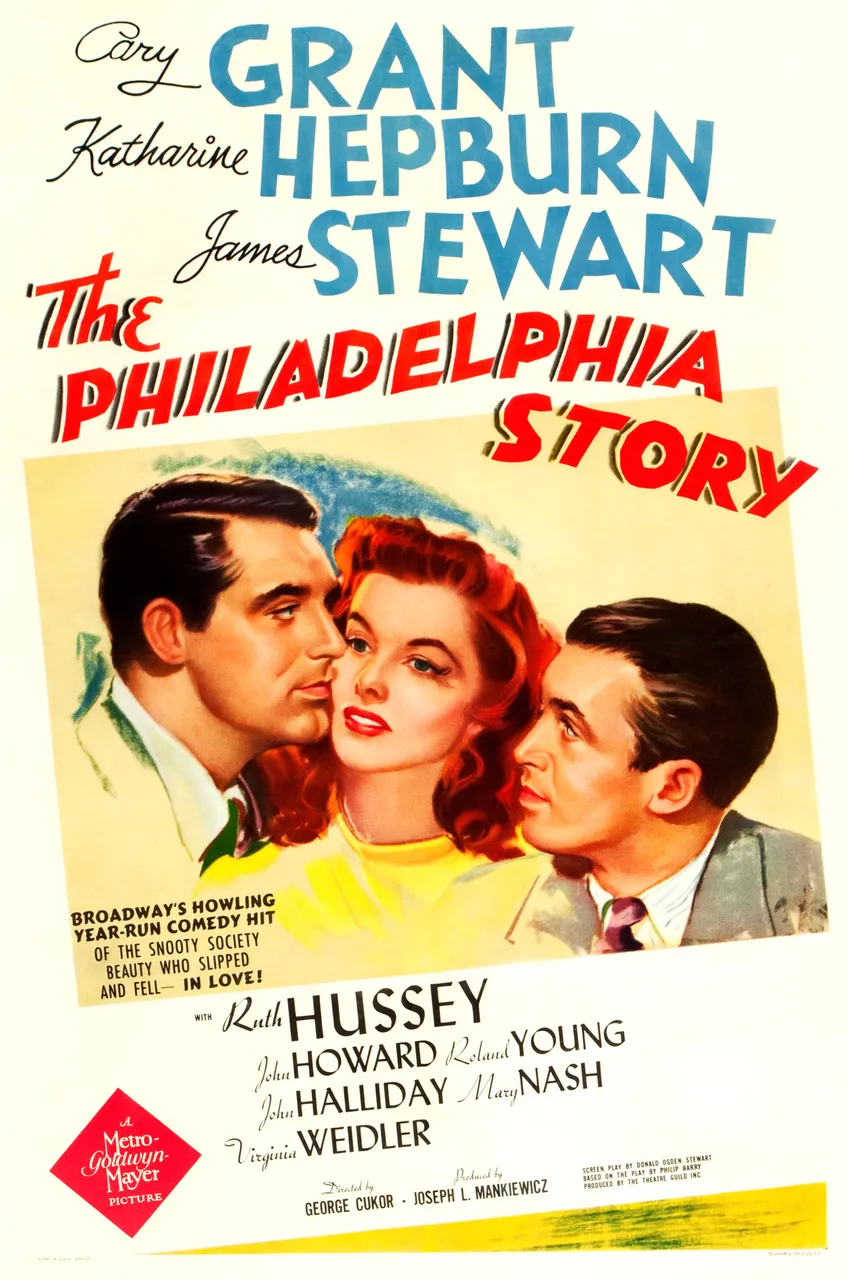
The Philadelphia Story is a 1940 American romantic comedy film directed by George Cukor, starring Cary Grant, Katharine Hepburn, and James Stewart. It is based on the 1939 Broadway play of the same name by Philip Barry. The story revolves around a socialite whose wedding plans are complicated by the simultaneous arrival of her ex-husband and a tabloid journalist. The film is known for its witty script, excellent direction, and outstanding lead performances, particularly by the main cast. It has been praised as one of the most sophisticated and greatest comedies ever made, with Katharine Hepburn's performance being particularly lauded.
Plot
The plot of The Philadelphia Story revolves around Tracy Lord (Katharine Hepburn), a Philadelphia socialite who is preparing to remarry. The story takes several twists and turns, with the arrival of her ex-husband, C.K. Dexter Haven (Cary Grant), and a tabloid reporter, Macaulay "Mike" Connor (James Stewart). Here are the key events in the plot:
- Tracy Lord, a wealthy Philadelphia socialite, divorces her husband, C.K. Dexter Haven, due to his drinking and her overly demanding nature.
- Tracy becomes involved with a self-made and dull business tycoon/millionaire, George Kittredge (John Howard).
- On the eve of her second marriage, C.K. Dexter Haven appears, intent on causing mischief.
- Dexter brings a tabloid reporter, Macaulay "Mike" Connor, and a photographer, Elizabeth Imbrie, with him.
- Tracy learns that Mike is a serious writer who works for the tabloids only to earn a living, and that he and Liz are attracted to one another.
- Suspicious of the reporters' intentions, Tracy discovers that they are there to expose a scandal involving her new fiancé, George Kittredge.
- As the wedding approaches, Tracy decides to turn the tables on Mike and Liz by revealing their true identities to her family and friends.
- The film ends with Tracy's realization that she still loves her ex-husband, C.K. Dexter Haven, and decides not to go through with her second marriage.
The movie explores themes of love, marriage, human growth, and class distinctions, with a witty and engaging screenplay that keeps the audience entertained throughout
Cast
- Katharine Hepburn as Tracy Samantha Lord
- Cary Grant as C.K. Dexter Haven
- James Stewart as Macaulay "Mike" Connor
- Ruth Hussey as Elizabeth "Liz" Imbrie
Supporting Cast:
- John Howard as George Kittredge
- Roland Young as William Q. Tracy (Uncle Willie)
- John Halliday as Seth Lord
- Mary Nash as Margaret Lord
- Virginia Weidler as Dinah Lord
- Henry Daniell as Sidney Kidd
- Lionel Pape as Edward, a footman
- Rex Evans as Thomas, the butler
- David Clyde as Mac, the night watchman (uncredited)
- Hilda Plowright as the Librarian (uncredited)
Director: George Cukor
Writer: Philip Barry, Donald Ogden Stewart, Waldo Salt
Box Office Gross: $411,663
Distributor: Metro-Goldwyn-Mayer
Genre: Comedy, Romance
Release Date: December 26, 1940
Theme
The theme of The Philadelphia Story revolves around the complexities of love, the challenges of communication, and the importance of self-discovery. The film explores the characters' struggles with their emotions, their relationships, and their social standing, ultimately highlighting the significance of authenticity and honesty in a world filled with deception and superficiality.
Reception
The Philadelphia Story has been praised for its witty script, excellent direction, and outstanding performances, particularly by the main cast. The film is considered one of the most sophisticated and greatest comedies ever made, with Katharine Hepburn's performance being particularly lauded.
Settings
The film is set in the 1940s, primarily in Philadelphia, Pennsylvania, where the main character, Tracy Lord, is a prominent socialite. The story takes place in various locations, including her family home, her fiancé's mansion, and the city's social circles.
Visual Styles
The Philadelphia Story features a visual style inspired by the photographers of the Farm Security Administration, with a focus on high contrast lighting, sharp shadows, and dramatic angles. The film also employs techniques from film movements, such as expressionism and German expressionism, to enhance the emotional impact of the story.
Techniques
Director George Cukor's techniques in The Philadelphia Story include the use of quick dialogue, clever camera angles, and a fast-paced editing style to create a sense of energy and excitement. The film also makes use of lighting to emphasize the emotions and relationships between the characters.
Trivia
- The film is based on the 1939 Broadway play of the same name by Philip Barry.
- The original screenplay was written by Philip Barry, Donald Ogden Stewart, and Waldo Salt.
- The film was released on December 26, 1940.
Fun Facts
- The film features a memorable line from Cary Grant's character, C.K. Dexter Haven, when he says to Katharine Hepburn's character, Tracy Lord, "You can't get married to a man who won't go away."
- The film was released on Blu-ray as part of the Criterion Collection on November 7, 2017